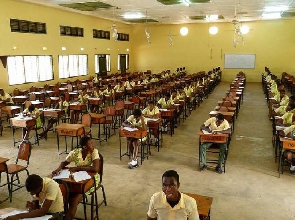 File photo: Schools should emphasize creative techniques starting from the primary level
File photo: Schools should emphasize creative techniques starting from the primary level
Sir Ken Robinson, a leading thinker on creativity and innovation, died in August 2020. I never heard about him until after his death. Like Robinson, I have an interest in fostering creativity and innovation in schools.
The news of Sir Robinson’s death nudged me to do something about the creative thinking project. I started a Facebook page, Creative Africa, that promotes creative intelligence and connects people of like mind.
The creative thinking program is not strictly a Nigerian project. The plan is to extend it to schools in other African countries as time goes on.
After reading about Ken Robinson’s life, I found his legacy quite inspirational. Sir Robinson was known for so many things, especially a Ted talk where he posed the question: “Do Schools Kill Creativity?” The talk is the most viewed of all times, with over 65 million viewers.
After listening to his talk, I agreed with Sir Robinson that schools are not doing enough to foster creativity and innovation. Rather than encourage the expression of creative ingenuity, the school system stifles and undermines this skill and competence.
Creativity is one of the most sought after skills by employers. Companies and businesses are always looking for persons that could bring fresh ideas or unorthodox solutions to problems.
Businesses want to hire people who are problem solvers, those who would grow, not ground their services and activities. Companies are looking to employ those who would steer their businesses in profitable and productive directions. Creativity and innovation are a valuable resource in this respect.
Thus the inculcation of creative thinking skills should be central to basic education and learning programs. Creative thinking should be infused in all subjects and disciplines. Schools should emphasize creative and innovative techniques starting from the primary level.
Schools should encourage the exercise of divergent and disruptive thinking. From an early age, pupils should learn and be taught to think out of the box.
Unfortunately, this is not the case in many schools in Nigeria and beyond. Rote learning characterizes the primary education system. Children are made to memorize, regurgitate, or reproduce what they have been taught as a demonstration of intelligence.
Pupils graduate from schools habitually afraid to think out of the box or to espouse new and different ideas.
While at the primary school level, there is an ample provision for verbal and quantitative reasoning, there is little or no emphasis on creative thinking skills.
There is no subject that teaches pupils to create and innovate. So, how do we expect children to become creative company executives or business managers in the future when they are not taught or trained to be innovative? How do we expect these children to create jobs and solve problems facing the country and the world when the school system kills their creative impulses? How can we realize a creative thinking society when we do not have schools that teach creative reasoning skills?
In primary schools, both verbal and quantitative aptitudes are distinct subjects. But this is not the case with creative reasoning. Some schools offer cultural and creative arts. And this subject has very little to do with creative and innovative competences.
The notion that associates creativity with cultural dance, music, and art informed this subject.
Creativity is much more than artworks or what artists do. Creative and innovative thinking applies-and ought to-apply to all areas of human endeavor.
So to foster creativity in schools, the learning culture must change. The habit of creative reasoning must be cultivated from the primary level. The idea of thinking out of the box must be mainstreamed in the curriculum, as well as in the socialization of children in schools and beyond.